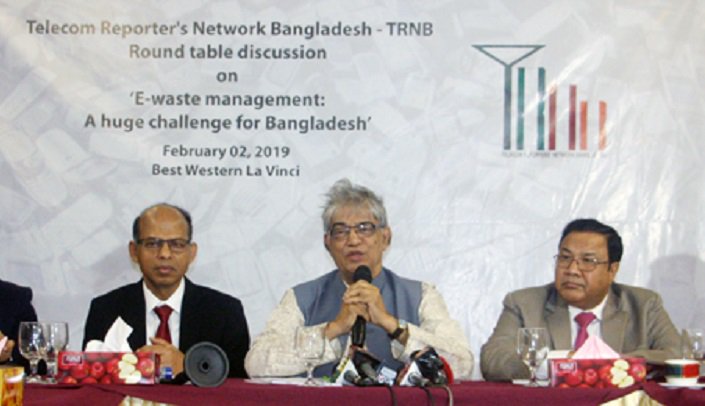E-waste could be used in billion dollar industry: experts

Gradual increased use of electronic devices and home appliances is generating a huge quantity of e-waste which could be used for recycling in a billion dollar industry for electronic waste management, opined experts at a round-table discussion here.
They said Bangladesh’s economy is expanding maintaining around eight percent annual growth which would also boost the usage of electronic devices and appliances and as none can stop it a time-befitting e-waste management policy is needed to address the issue.
Telecom Reporters Network Bangladesh (TRNB) today organized the discussion dubbed “e-waste management: a huge challenge for Bangladesh” in a city hotel where policy makers, stakeholders, experts and leaders of country’s telecommunication, information and communication technology took part.
“e-waste management could be a billion dollar industry as the usage of the electronic products is growing significantly,” said Robi managing director and Chief Executive Officer Mahtab Uddin Ahmed.
The industry is now able to collect only 3 percent of the total e-waste that is why collection of e-waste is needed to be systematized, opined Ahmed.
Chairman of Azizu Recycling and e-waste Ltd M Abul Kalam Azad said they have developed a recycling plant, but cannot make the plant fully functional due to the shortage of e-waste.
To evolve the industry, he requested the authorities concerned to set up a collection and supply chain channel of e-waste to clean up the country.
To develop a channel, Bangladesh Mobile Phone Importers Association President Ruhul Alam Al Mahbub Manik proposed that they will organize a campaign in different shopping malls in the city to collect mobile devices.
“We may pay Taka 100 to Taka 200 for each unusable and disposable mobile device to the customers to dump those to the mentioned points and we will send it to the e-waste managing companies,” said Manik, who is also the chairman of Fair Group, local assembler of Samsung brand mobile in the country.
At present, around four crores mobile phones are being entered into the country annually but within next two or three years that would become e-waste.
Speaking on the occasion as chief guest, Posts, Telecommunications and Information Technology Minister Mustafa Jabbar said e-waste is always not creating challenges but sometimes it also creates opportunities for the investors. “Managing e-waste can become an industry and this industry also deserves tax holidays and cash incentives as they can boost export and will also help clean our environment.”
In next course of action the government needs to create a channel to collect e-waste from the remotest part of the country as it creates environment challenges to the nation, said Jabbar.
Bangladesh Telecommunication Regulatory Commission chairman Md Jahurul Haque said the regulator will provide support on e-waste management and the government would consider to supporting from the social obligatory fund.
BTRC will not provide any license on import of electronic products without e-waste management capacity, he said.
Director general of the department of environment Sultan Ahmed said in addition to the mobile phones, the country also uses about seven lakh computers, 29 lakhs televisions, 2.55 crore CFL bulbs, 40 lakhs fans, 1.55 lakh refrigerators, about 95,000 air conditioners and 30,000 deep freezers annually and that is also other sources for creating e-wastes in the country which is health hazardous for the environment.
Former TRNB President Rased Mehedi said like food items, expiry date is needed to be mentioned on the electronic goods and after expiring the dateline the companies should make those mandatory the recollection from the markets.
Bangladesh University of Engineering and Technology (BUET) Professor Dr Rowshan Mamtaz and Managing Director of NH enterprise recycling Nazmul Hyder also spoke with TRNB President Muhammad Zahidul Islam in the chair.
Three presentations were also placed by the TRNB general secretary Samir Kumar Dey, BMPIA joint secretary Mohammed Mesbah Uddin and Mohammad Abdur Razzak, chief waste management officer North Dhaka City Corporation.
